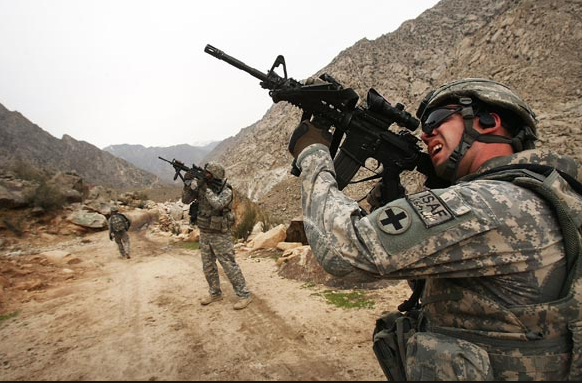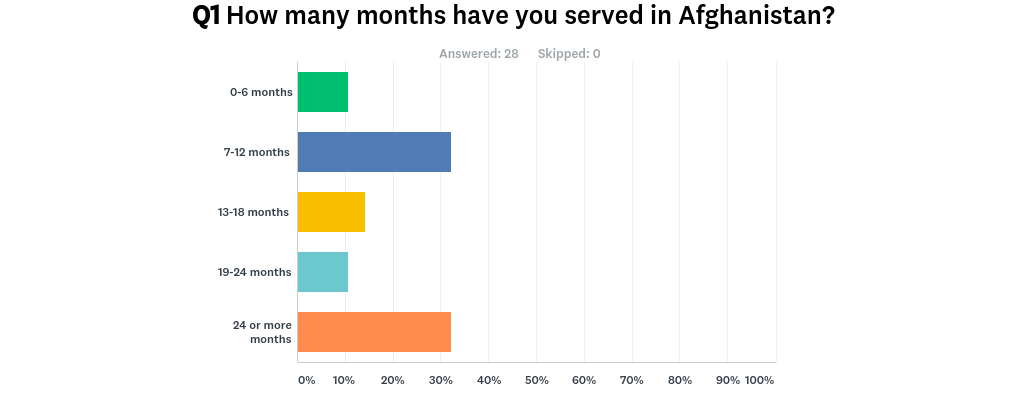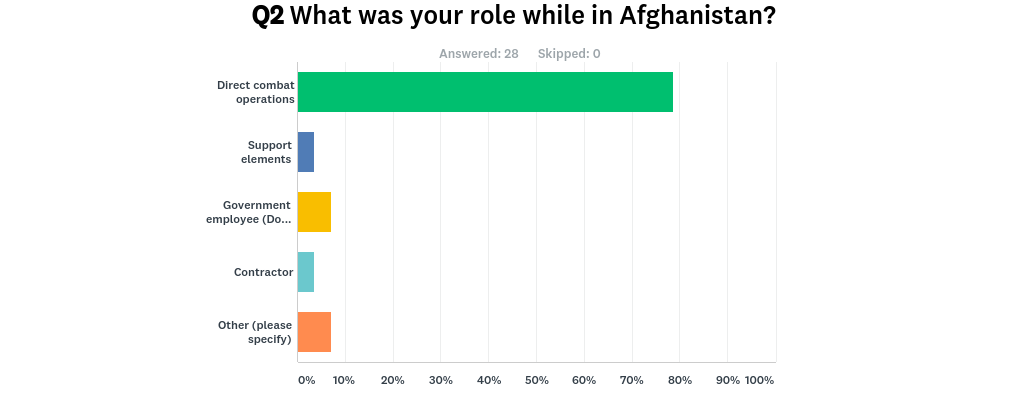
By Charles Bausman
As the policy discussions in Washington D.C. continue on what the U.S. should do in Afghanistan, we asked the MTI community, many with multiple deployments to Afghanistan, what we should do in the country. (CLICK HERE to see the original article)
75% of the respondents, all of whom have served in Afghanistan, said that the country is not worth fighting for.
Many reasons were cited for getting out of the country militarily. The primary reasons were:
- A lack of cultural unity, challenging the legitimacy of a unified Afghan national government
- A lack of U.S. focus on an overall objective and end state for Afghanistan
- After 16 years, it is time for the Afghan military and government to take the lead
- Corruption in the Afghan government and safe havens in Pakistan negate any gains of U.S. and allied forces
The respondents who argued for a continued presence stated that Afghanistan is still readily able to host terrorist organizations for attacks beyond the Afghan borders, as well as the commitment, is worth seeing through to the end to justify the lives and treasures lost in the country.
We’ve included all responses below. Served in Afghanistan and have something to say? Scroll to the bottom of the page to fill out the survey.


3. What are the policy makers missing?
-Desired end state
-Carrot and stick method. Force the government to work for the people or we withdraw incentives. Weed out corruption, tell the Afghan government to punish those who engage in unethical behavior, not only in the national but provincial and district levels. Support and grow the Afghan Air Force. Increase pay for Afghan military members.
-They are missing purpose- what was our purpose of going there? To punish Al Qaida for 9/11. Mission accomplished- we need to pull out and leave a CT force to assist in any entity attempting to plot against us or our close allies.
-We will never control Afghanistan and we can’t force American style freedom on a population that doesn’t want or need it. Afghanistan’s tribal culture has existed far longer than the US has and it has served their needs.
-We failed to study the history of Afghanistan. No foreign army has ever invaded the country and won a war there. Cut our losses and leave. Look up the phrase “you have the watches, but we have the time.”
-Leverage SOF capabilities. Conventional forces cannot engage culture like highly trained, smaller forces. Afghanistan is not a civilized nation. The people are still human beings, but they lack the ability to come together and act as a unified whole. This is why the copious aid we’ve pushed toward them has failed. SOF assets would not be there to solve anything. They would only address symptoms of larger problems.
-Nature of the combatants, understanding of terrain and the effects it has on success or failure, and the fact that you can’t win unless you commit more people.
-What is the end state the U.S. desires to achieve in Afghanistan. Once that is decided, set policies and activities to meet that end state. The attempts of the U.S. to have Afghanistan become a Jeffersonian Democracy will never be realized in an area where the loyalties of the majority of the population are to individual tribes and not to a nation state.
-Distinct understanding of the ancient tribal system that truly controls Afghanistan. This doesn’t fit with the planned government and is the same reason communism failed to take hold
-Missing knowledge of reality on the ground. Our cultures are so dramatically different that even us “trying to do the right thing” backfires.
-The people do not want us there… period. End of statement.
-That Afghanistan has thousands of years of tribal culture that isn’t magically going to convert over into a democracy overnight, or even over a decade. Additionally, we can’t want it more than the Afghans themselves want it.
-The mission ended when UBL was killed. If we are going to remain here, we need to take advantage of the resources Afghanistan has, such as lithium and other precious metals, and make them pay for the security and stability we are providing with favorable trade agreements to extract and bring these materials to the US. If we don’t, the chinese certainly will. Beyond that, “nation building” is a big fail.
-Providing real education to the Afghans and understanding that to really change things we need to be there for at least 20 more years. Worth it?
-That the Afghan people don’t comprehend freedom, you cannot win a campaign the people are incapable of buying into. The goal was Bin Laden and close terrorist training camps. Time to let Afghanistan sort itself out, people will rise up if they actually care.
-Influence of outside actors from China, Pakistan, Iran, and other areas
-courage. they all know it is winless, but no one wants to admit it and lose votes
-A end game contextualized within local dynamics. In a sense, the war is unwinnable. We cannot change people’s hearts – as much as we think we can. Many of the people I interacted with on a daily basis simply wanted to live their lives as best they knew how.

5. Why or Why Not?
-To prevent another 9/11
-There is a statistic floating around that over 40% or more of terrorism is born/live/have safe haven in Afghanistan. We need to deny terror groups the ability to operate freely to prevent future attacks not only in Afghanistan, but all over the world.
-Once on patrol and elder told me- All I want for my family is security/predictability. When the Taliban was here I knew what I/my family could and could not do. It was very clear and the reprecussions for not doing it were very brutal (stoning/beheading ect) but we knew the rules. With the govt in charge one day I get taxed one day I don’t, one day I am beat by security forces one day by the district governor and then taxed by the Taliban….I wish the Taliban was back in charge. By the US govt bringing the corrupt govt to the people we are making it worse off.
-There is no way for us to come out on top and/or force our American ways on them.
-If you’re not going to invest in security in Afghanistan — if you’re going to allow it to devolve into a lawless sanctuary once again — then you should take all of your money and invest in giant walls, because that’s the only alternative to protecting Americans and American interests.
-We’ve invested a serious amount of money as well as those who’ve already given their lives. We need to see it through!
-It never was worth fighting for. The Afghanistan everyone imagines does not exist. It is more like 13 tribes kicking the shit out of each other that have slacked off a bit in hopes of grabbing some US$
-The Afghan government does not desire to enact change to allow itself to effectively end the Taliban and HQN threat. Nothing the U.S. can do will improve this situation. The country has held free elections and the people (as directed by their Maliks) have voted for their representatives. It is time to let the country decide its own fate.
-We’ve wasted billions of dollars and every strategic and tactical move we make creates more issues than it solves. Working on a paper for this as my senior research thesis
-No natural resources to justify our costs of operation. Nothing in it for Americans to prosper.
-Not a black and white answer. The time for Ranger Bat to be conducting full frontal assaults in Eastern Nanghahar should be long past. I have fought in those valleys, and up into Kunar, killing large swaths of fighters through air strikes and firefights. Following each engagement, the losses did not matter to their numbers, they have a never ending pool of recruits to conduct these small scale attacks and spectacular attacks. In the end, continuing to stand up a competent Afghan Defense Force, able to hold major territory along with precision coalition CT and targeting is the only way to start tamping off the flow of fighters into the Taliban/ISIS/HiG/etc. As long as there is an overt American presence, they will continue to fight and die.
-You can’t bring 17th century culture and tribal divisions into the 21st century.
-Finish the mess we started
-Limited strategic value, we used it in the 80s to collapse Russia economically and now are doing to ourselves.
-A common saying is “if these walls could talk.” In Afghanistan, I want to know what the rocks would say. Going back thousands of years, that place has been a metaphorical quagmire for invaders.
-The cost is too high. We need to focus our priorities and come up with and end-game strategy and leave soon or we will continue to incur more debt. Who are we fighting? What is the focus?
-Nothing in the mindset of the Afghan people will change. They don’t identify as a nation, but instead as tribes. Until they obtain some type of national identity, any state building solution there will fail.
-the people there don’t want our style of government outside of the city centers. we can’t want it more then they do. We can always re-attack from a friendly middle east country or a carrier if ISIS-K et all, gains a foothold.
-Yes – but not by more US troops. The goal was always to get the Afghans to take the lead. Eventually, they need to do that. If not now, then when? They will never be ready enough – none of us ever are for anything in life.
-Westerners (me) are trying to change an ideology of how a country is governed, it doesn’t work when the majority of the population is uneducated
6. What do you think is the biggest obstacle to defeating the insurgency in Afghanistan?
-The collective tribal society….the insurgency is the people and without “taking care of Pakistan” nothing will change in AFG.
-We try too heavily to force our culture on theirs. They know we will not be there forever. But the Taliban or equivalent will be. They can pretend to side with us, but they know who will be around for the long term.
-Our lack of understanding of the Pashtun/Afghan tribal mentality, culture, warrior code.
-The Afghan inability to unify and act as a nation.
-Trying to create a centralized approach in a country and region where it’s culturally unfounded.
-Tribal nature of the locals
-That there is no Afghanistan to be fighting over.
-No loyalty by the people to the centralized government. This is caused by high levels of corruption. When people do not feel loyal to their own government, an insurgency is impossible to defeat.
-The non stop flow of foreign fighters and weapons from Pakistan. Corruption and distrust in the local government.
-The tribal system and lack of understanding of local population
-Improper understand of cause and effect in the context of local/tribal/religious customs, problems, and socioeconomic realities.
-The fact that we are foreigners. T.E. Lawrence (Lawrence of Arabia) stated “Do not try to do too much with your own hands. Better the Arabs do it tolerably than you do it perfectly. It is their war, and you are to help them, not to win it for them.” As long as we are doing it will never last. That is their home and they need to be the driving force. The separation that divides the tribes is to large for them to come together. They understand fear, but they have their pride and that is their entire identity. There is nothing we can do for them.
-Too much of the general population still supports the insurgency. Until that changes, it’s a giant game of live-fire whack-a-mole.
-Large scale American involvement and safe havens in Pakistan.
-The Taliban, AQ, ISIS and other criminal entities simply have to wait us out
-Education and a longer term vision
-Not really possible, to many people in that country that support Taliban or that form of government ran by extremist ideology. Lie to your face during the day, rape little boys, and subjugate women at night.
-I would normally say that our politicians need to cut the leash restraining the military. Let Mattis and everyone else do what they do best. We have sixteen consecutive years of combat experience. I’d rather let the military have free reign than listen to war-weary politicians who criticize it only as a means to get reelected. However, I can’t say that with regard to Afghanistan as Mattis even admitted we have no plan to fix the problem.
-Time, troops, and rules of engagement that are too limited.
-Troop levels and the American public not supporting thousands more US deaths it would take to completely eradicate the Taliban. It would probably take 3 years of mass mobilization like WWII to hold the terrain
-We are an occupation force that’s been fighting for 16 years. If the insurgency is to be defeated, it must be done by the Afghan people.
-The current corruption of the Afghan government and the mistrust of the government by the people.
-Hearts & Minds doesn’t work.. Short story, I asked local Afghans who were alive when the Russians were there how bad was it, they said pretty bad. I then asked if the Russians came back and wanted to give more money and support than the U.S. is giving would you welcome them… they said yes… Afghan culture is “live for today” what opportunities are there for me and my family for the close foreseeable future.. They are an opportunistic people and that clashes with what western culture is trying to do. Many have tried and many have failed throughout history…
7. Which of the policy options listed below would you support?
More Troops
President Trump has approved Secretary of Defense Mattis to send up to 3,900 more troops to Afghanistan. These pre-approved troops have yet to be deployed, as Secretary Mattis attempts to clarify the policy positions of the Trump administration.
The proponents of additional troops make up the majority of the administration’s national security team – National Security Advisor H.R. McMaster, SecDef Mattis, SecState Tillerson, General Dunford (Joint Chief of Staff) and General Nicholson (Commanding General of American forces in Afghanistan) all recommend additional troops.
The additional troops would provide further training, equip, and support for Afghan forces. No timeline has been specified for a troop increase, which was a source of contention during the Obama administration, possibly allowing insurgent groups to ‘wait out’ U.S. forces.
Former security officials such as Jack Keane and Leon Pancetta have stated that the 3,900 troop increase is not nearly enough to make an impact on the security situation in Afghanistan.
Full Withdrawal
The Wall Street Journal reported on July 30th that some members of the Trump administration were exploring the possibility of a full withdrawal from Afghanistan.
This option may have been taken off the table according to the Washington Times, but it displays the frustration of Trump officials over policy options in Afghanistan. White House Chief Strategist Steve Bannon supposedly support further exploring this option.
Status Quo
This isn’t necessarily an option anyone is recommending, but rather the ground level fact as the deadline for an Afghan policy sits over due. Troop levels remain the same with the same mission sets.
The status quo has been described as an eroding stalemate as the Taliban and other groups retake ground from the Afghan government.
The Contractor Option
Erik Prince, the founder of Blackwater and other military contracting businesses, proposed a private military contractor option for Afghanistan. He penned an op-ed in the Wall Street Journal and has recently made the television media rounds.
He recommended the establishment of a lead federal leader or ‘viceroy’ with private military advisors implemented at the Afghan battalion level in the fight against the Taliban. Prince also recommended a model based loosely on the Britsh East India Company, which served as the private business arm of the colonial effort in the Americas and India.
(CLICK HERE to see a recent interview with Prince on the topic.)
This idea was apparently met with contempt by H.R. McMaster and Secretary Mattis, but administration officials such as Steve Bannon and Jared Kushner have enabled Prince to gain the ear of the President.
Previous Options – Biden’s CT Plus
During the Obama administrations deliberations on Afghan Policy, Vice President Biden proposed reducing COIN focused troop levels, instead emphasizing counter-terrorism operations by special operations forces.
This would have focused on removing insurgent and terrorist leadership elements along with logistical support, and letting go of the counter insurgency based doctrine which required much higher troop levels of conventional forces.
This option was not chosen but likely remains in the minds of some officials as the Taliban continues to regain territory.

‘Other’ option responses:
-We need personnel there to deal with issues and “keep eyes on” potential future threats – but we should also be honest with ourselves and realize that culture is not transformed by military operations
-A radical change in approach – using the troops that you have differently…
-CT Plus, but understanding that Conventional Forces are not equipped to conduct COIN operations. Small scale COIN with specialized SOF forces, who are trained for these types of missions, will lower the American signature and greatly enhance the capabilities of the Afghan Forces.
-Military force for the explicit purpose of getting the natural resources AFG has waiting in the ground. It would be the only legitimate source of national income for this place.
-Let Afghanistan pay contractors to secure it…
Have something to add to the conversation? Please complete the survey below…
